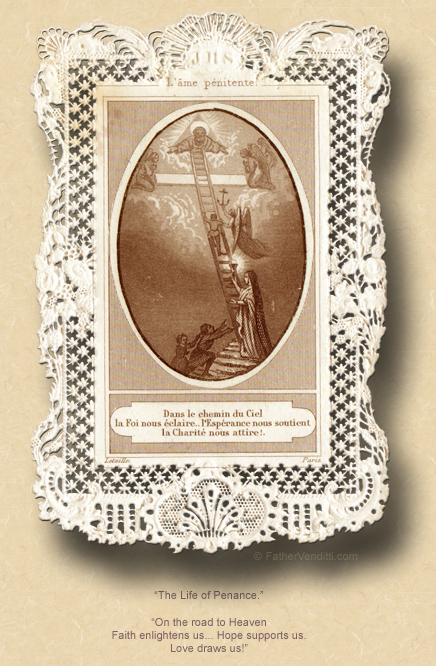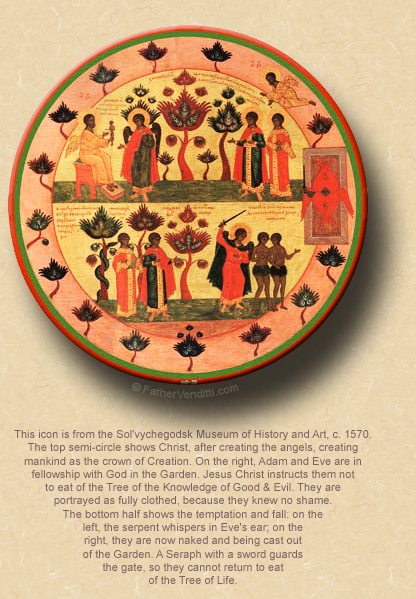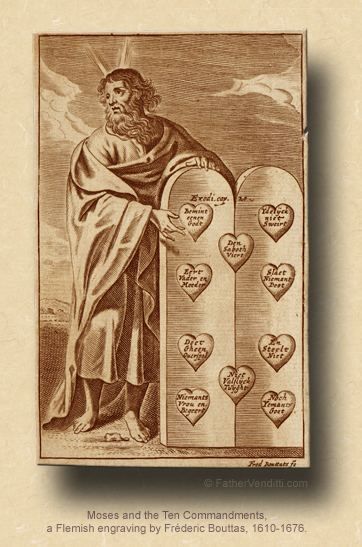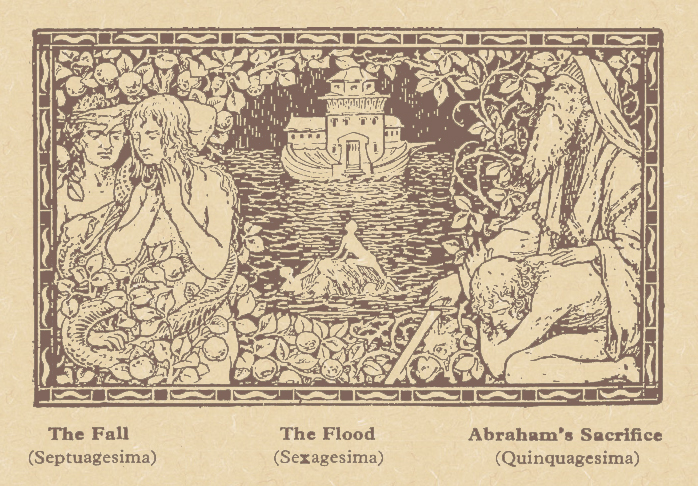…to Avoid the Near Occasions of Sin.
The Sixth Sunday of Ordinary Time.
Lessons from the primary dominica, according to the ordinary form of the Roman Rite:
• Sirach 15: 15-20.
• Psalm 119: 1-2, 4-5, 17-18, 33-34.
• I Corinthian 2: 6-10.
• Matthew 5: 17-37.
[or Matthew 5: 20-22, 27-28, 33-34, 37.]
Septuagesima Sunday.
Lessons from the dominica, according to the extraordinary form of the Roman Rite:
• I Corinthians 9: 24-27; 10: 1-5.
• [Gradual] Psalm 9: 10-11, 19-20.
• [Tract] Psalm 129: 1-4.
• Matthew 20: 1-16.
The Second Sunday of the Triodion, known as the Sunday of the Prodigal Son.
Lessons from the triodion, according to the Ruthenian recension of the Byzantine Rite:
• I Corinthian 6: 12-20.
• Luke 15: 11-32.
FatherVenditti.com
|
6:50 AM 2/12/2017 — It’s wonderful to be back with you again after my time away. The people here who work with me know how much I always look forward to getting away at some point during the winter lull, but the best part of any trip is coming home. Today is also the anniversary—shy one month—of the passing of our own Scott Riccio, whom many of you will remember as he served here as our head of maintenance for many years, and a number of his family and friends are here with us today, as the Mass is being offered for the repose of his soul. All of us who knew him remember him as a delightful and helpful man who did his work in a quiet and unassuming way, always with a good sense of humor, always a smile on his face no matter what the emergency. So, as we pray Holy Mass together today, let’s all make sure we remember him to our Blessed Lord and add our own prayers for him to the offering of the Mass.
 For those of you who occasionally hear Mass in the extraordinary form, you would know that today begins what is traditionally known as the Septuagesima season; the priest would already be wearing the purple of Lent, and we would already have replaced the Alleluia with another verse. In English speaking countries, this season was sometimes called “Shrovetide,” because it ends on the day before Ash Wednesday, which was often called “Shove Tuesday.” It's actually a universal practice, and is preserved to this day in every Christian Church that has a serious liturgical tradition, even the more traditional brands of the Anglican and Lutheran communions; in the Eastern Catholic Churches, in which I served for many years, as well as in the Orthodox Churches, it's called the Triodion, and it actually started last Sunday. It was, of course, eliminated in the ordinary form of the Roman Rite during the reforms following the Second Vatican Council; and, if you go on the Internet, you'll find numerous articles by people wringing their hands over whether that was a good idea, especially since many of those reforms were supposed to be for ecumenical reasons. The best way, I think, to describe Septuagesima is as a preparation for the preparation: if Lent is supposed to prepare us for Easter, then Septuagesima is designed to prepare us for Lent. For those of you who occasionally hear Mass in the extraordinary form, you would know that today begins what is traditionally known as the Septuagesima season; the priest would already be wearing the purple of Lent, and we would already have replaced the Alleluia with another verse. In English speaking countries, this season was sometimes called “Shrovetide,” because it ends on the day before Ash Wednesday, which was often called “Shove Tuesday.” It's actually a universal practice, and is preserved to this day in every Christian Church that has a serious liturgical tradition, even the more traditional brands of the Anglican and Lutheran communions; in the Eastern Catholic Churches, in which I served for many years, as well as in the Orthodox Churches, it's called the Triodion, and it actually started last Sunday. It was, of course, eliminated in the ordinary form of the Roman Rite during the reforms following the Second Vatican Council; and, if you go on the Internet, you'll find numerous articles by people wringing their hands over whether that was a good idea, especially since many of those reforms were supposed to be for ecumenical reasons. The best way, I think, to describe Septuagesima is as a preparation for the preparation: if Lent is supposed to prepare us for Easter, then Septuagesima is designed to prepare us for Lent.
Those of you who have no experience except with the liturgical tradition of the Latin Church after Vatican II may find it overkill to have a time of preparation for Lent itself; but, you must remember that, in centuries past, Lent was not just a time to prepare ourselves for Easter by giving up chocolate and saying a few extra prayers. When the Church was young—and the Apostles were still preaching the words of our Lord from memory—very few people were born into the faith; they joined the Church as adults. And joining the Church meant a big change in a person’s life, especially in an age of persecution. Lent was a time of intense study, prayer, fasting and personal purification. Baptism, after all, is the restoration of Sanctifying Grace, one should not take it lightly.
And, as in all things, the Church follows the example of our Lord who, before beginning the work he came to do, fasted and prayed in the desert for forty days. He didn’t give up chocolate and television for forty days; he fasted and prayed for forty days. And so, the Church, following a tradition handed down from the Apostles, places great emphasis on this thing we call Lent, so much so that before we even enter into it we take time to prepare with two or three weeks, depending on the date of Easter, during which we gradually ease ourselves into a spirit of self-denial.
During the vacation, from which I just returned, I had the chance to go swimming, but I had not been swimming for a long time, and the water seemed cold to me; so, instead of diving right in—if you can picture such an ungraceful thing—I walked into the water slowly, little by little, splashing myself in order to acclimate to the temperature of the water. That’s what we do during Septuagesima; we acclimate ourselves to, first, acknowledge that we are sinners and need to reform our lives, then we try to accustom ourselves to the notion that, in spite of our sinfulness, God really does want us to reform; and we begin, little by little, to impose upon ourselves that measure of self-denial that makes the reform of our lives possible in grace.
The Eastern Churches have an interesting custom: the two weeks before Lent begins are focused on specific objects for our self-denial: the week of Meatfare is the last week before Easter during which they eat meat, and the week of Cheesefare is the last week in which dairy products are eaten, and during Lent itself they eat neither;  so, they take the idea of fasting during Lent very serious indeed; and, the last Sunday before Lent, which is called Cheesefare Sunday, is also called the Sunday of Forgiveness, because it is presumed that, if one is focused on self-denial so thoroughly, one is going to be something of an annoyance to others, so the idea is that we forgive each other in advance for all the inconvenience that our practices of mortification will cause. so, they take the idea of fasting during Lent very serious indeed; and, the last Sunday before Lent, which is called Cheesefare Sunday, is also called the Sunday of Forgiveness, because it is presumed that, if one is focused on self-denial so thoroughly, one is going to be something of an annoyance to others, so the idea is that we forgive each other in advance for all the inconvenience that our practices of mortification will cause.
And here is where there is still something of this left in the ordinary form of the Roman Rite in which we celebrate here at the Shrine, even if we are still singing Alleluia and no longer calling it the Septuagesima season; because, you may have noticed that the first lessons for Holy Mass on the weekdays of this past week and the week to come are all taken from the account of creation in the Book of Genesis, which figures prominently in the texts used both in the Eastern Churches and in the extraordinary form of the Roman Rite. They focus us to contemplate God’s supreme act of judgment upon man: the expulsion of Adam and Eve from the Garden of Eden. What was the sin of Adam and Eve? It wasn't just eating an apple that, for totally arbitrary reasons, was forbidden to them; the fruit was from the Tree of the Knowledge of Good and Evil, and the act of eating it symbolizes the attempt to take away from God the power to decide good from evil and decide it for ourselves; in other words, the sin of Adam was the sin of wanting to be God, repeated in each one of us every time we set aside God’s law and decide for ourselves what’s right and wrong. That’s why it’s called the “Original Sin,” because all sin stems from it. And man paid a penalty, as the Book of Genesis tells us: our food and livelihood are no longer supplied by God, but by the sweat of our brow; the nakedness of our bodies ceases to be a thing of beauty and becomes a source of temptation; even the pain of a woman in childbirth, Genesis tells us, is the result of that one first sin. So terrible is that sin—usurping the authority of God and deciding for ourselves the difference between right and wrong—that its effects are passed on through every generation, which is why we are born in this state of original sin.
And, yet, in spite of this, God still judged man worth saving: He loved His creation so much that, instead of allowing man to suffer the price for that sin, He became a man Himself and suffered it for us. That's another reason why the Sunday before Lent in the Eastern Churches is called the Sunday of Forgiveness, and from it we can take away a useful lesson: because instead of simply forgiving us—which would have obfuscated the very concept of his justice—God chose instead to become one of us and pay the penalty of death Himself. If God has chosen to do that, then how can we continue to harbor ill thoughts against another whose wrong against us is so petty in comparison? Our Lord addresses this Himself in part of our Gospel lesson today, when He reminds us of how hypocritical it is to present ourselves at the altar while still harboring ill thoughts against our neighbor.
But more to the point, I think, as we barrel toward Ash Wednesday on March the first, is the admonition our Scripture lessons present to us to return again to the basics of our faith: the keeping of the Commandments. Both our first lesson from Sirach and our Gospel lesson from Matthew—not to mention today’s psalm—remind us of the necessity of obeying the Commandments.  Nothing surprising or earth-shattering in that, but tucked away in our Lord's little sermon today is the concept of the occasions of sin. In our Act of Contrition we routinely promise our Lord that we will avoid them, but we don't often consider how prevalent they can be. Avoiding occasions of sin requires forethought, and so often our sins are the result of having none. Someone who find himself stumbling upon some pornographic web site while using his computer in the evening hours when vulnerability to the sins of the flesh is most common may have to make a resolution not to touch his computer during those hours of the night; that would be a decision he would make in order to avoid an occasion of sin. Part of the problem is that occasions of sin are subjective: what's an occasion of sin for one person may not be for another. Our eating habits can serve as a good analogy here: I'm a diabetic, and I also have no stomach, having had much of those bits surgically removed; so, when someone puts a slice of double-fudge chocolate cake in front of me, it doesn't tempt me because I know from experience that even just one bite could make me violently ill for the rest of the day; but, someone else may find that slice of cake difficult to resist. In the same way, what's an occasion of sin for one person may not be for another. Another analogy: someone who is not an alcoholic can have a glass of wine with his meal with no consequences, but an alcoholic cannot because even just one sip could result in a binge that would lead to a relapse into drunkenness. Nothing surprising or earth-shattering in that, but tucked away in our Lord's little sermon today is the concept of the occasions of sin. In our Act of Contrition we routinely promise our Lord that we will avoid them, but we don't often consider how prevalent they can be. Avoiding occasions of sin requires forethought, and so often our sins are the result of having none. Someone who find himself stumbling upon some pornographic web site while using his computer in the evening hours when vulnerability to the sins of the flesh is most common may have to make a resolution not to touch his computer during those hours of the night; that would be a decision he would make in order to avoid an occasion of sin. Part of the problem is that occasions of sin are subjective: what's an occasion of sin for one person may not be for another. Our eating habits can serve as a good analogy here: I'm a diabetic, and I also have no stomach, having had much of those bits surgically removed; so, when someone puts a slice of double-fudge chocolate cake in front of me, it doesn't tempt me because I know from experience that even just one bite could make me violently ill for the rest of the day; but, someone else may find that slice of cake difficult to resist. In the same way, what's an occasion of sin for one person may not be for another. Another analogy: someone who is not an alcoholic can have a glass of wine with his meal with no consequences, but an alcoholic cannot because even just one sip could result in a binge that would lead to a relapse into drunkenness.
When our Blessed Lord, in his little homily today, says that “whoever breaks one of the least of these commandments and teaches others to do so will be called least in the Kingdom of heaven” (Matt. 5: 19 RM3), He's not talking about someone overtly going around saying, “Let me teach you to break the Commandments”; He's talking about how easily it is for us to—often unwittingly—place someone else in what's an occasion of sin for them, even it is isn't one for us. A text message of a risque nature, for example, may not have any effect on us, but sent to someone else could be an occasion of impurity for that person.
Remember the little Examination of Conscience cards I was giving out during Advent? There's a question on there which asks us to consider whether we've done anything to lead someone else into an occasion of sin: that's because there are things we could say or do which may have no moral implications for us, but which could lead someone else into a temptation toward sin. How are we supposed to know what might be an occasion of sin for someone else? We can't know. That's why our Lord is so forceful in His words today: when dealing with the souls of others, extreme caution and prudence is always indicated.
Let us ask our Lord today not only for the courage to avoid whatever may lead us into sin, but for an increase in the virtue of prudence, so that nothing we say or do could possibly be an occasion of sin for anyone we may meet along the way.

|

